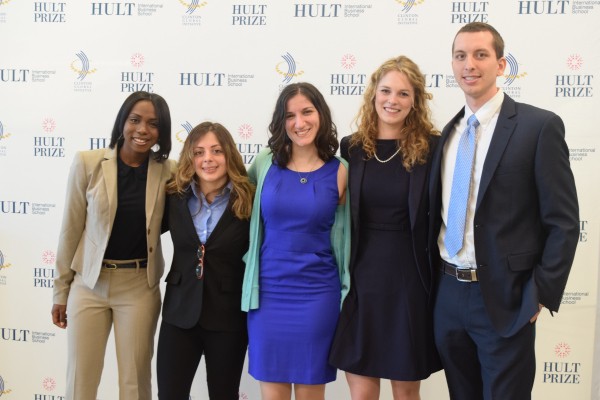
(Left to Right) Dana Loatman, Raya Al Ageel, Francesca Longo, Stephanie Brueck and Greg Cassoli participated in the Hult Prize Foundation Social Enterprise Competition. Loatman, Brueck, and Cassoli are BCSSW students. Al Ageel is at the Carroll School, and Longo is at the Lynch School.
The next generation of social workers will need to be able to think differently about how to solve the world’s problems. Many will work to build sustainable social innovations that enhance social justice, precisely the mission of the Boston College School of Social Work’s Center for Social Innovation. Virtually all will find themselves in collaborative environments, working hand in hand with like-minded professionals from all sorts of backgrounds, who are dedicated to effecting change across a multitude of fields.
This March, a trio of current BCSSW MSW students showed that they’re already innovating in unique ways, and flexing enough collective muscle to be recognized by two of the world’s leading organizations dedicated to social innovation: the Clinton Global Initiative (CGI) and the Hult Prize Foundation. Dana Loatman, Greg Cassoli and Stephanie Brueck, along with colleagues from the Lynch School of Education and the Carroll School of Management, were named regional finalists in the annual Hult Prize Foundation $1 Million Social Enterprise Competition. This was a prestigious commendation; out of 20,000 entrants worldwide, only 300 made the regionals.
Earlier this year, in a speech at the CGI Annual Meeting, former President Bill Clinton challenged potential teams to build “sustainable and scalable social enterprises to address early childhood education in urban slums and beyond.” BC’s team quickly built their response under the oversight of Carroll School of Management part-time faculty member Laura Foote, and the direction of BCSSW’s Loatman, who was named team leader.
“I was very impressed with the commitment and creativity of the students on the BC team,” Foote told the BC Chronicle. “They got invaluable experience from taking on the challenge, brainstorming ideas, and developing a sustainable high-impact idea to pitch to the judges.”
The BC entry was DialogBag, a portable engagement tool designed to stimulate the kinds of interactions that are critical to early childhood development. But the project didn’t begin and end with the impressive prototype that they created, and then tested; the team planned to build a collaborative network of providers to teach parents, caregivers, and peers how to best use the product. They also arranged to partner with socially responsible corporations in order to create an inexpensive bag that families living on less than $1 per day could afford to purchase.
“It was a great experience working collaboratively with other high-powered students in other schools,” said Loatman. “At the beginning, we didn’t always understand each other, but in the end, we gained valuable experience into how professionals from various fields can combine expertise toward solving some of the world’s biggest problems.”
The BCSSW students were nothing if not ambitious: Their stated goal for DialogBag was to reach more than 12 million children in seven countries within five years. And their presence in the entrepreneurship competition was unique – Loatman says that she didn’t encounter any other MSWs among the 50 other teams participating in the Boston section of the Regionals. Now that the competition is over, the team will continue to meet and discuss the real world potential of DialogBag over the coming weeks.
“The Hult Prize doesn’t represent the world that social workers typically operate in, but it’s clear that entrepreneurship can help us to do our jobs better,” she explained.
“So much in social work is theoretical because we must do our work within long established systems, and we find ourselves often saying, ‘we could do this if only the system was different.’ In many ways, this competition provided a refreshing reminder that there are ways to effect social change – we had a problem to solve, and we were able to go outside the box and come up with a real actionable solution. This is the space I want to be in as I move forward in my career, using innovative entrepreneurship to change the world.”

